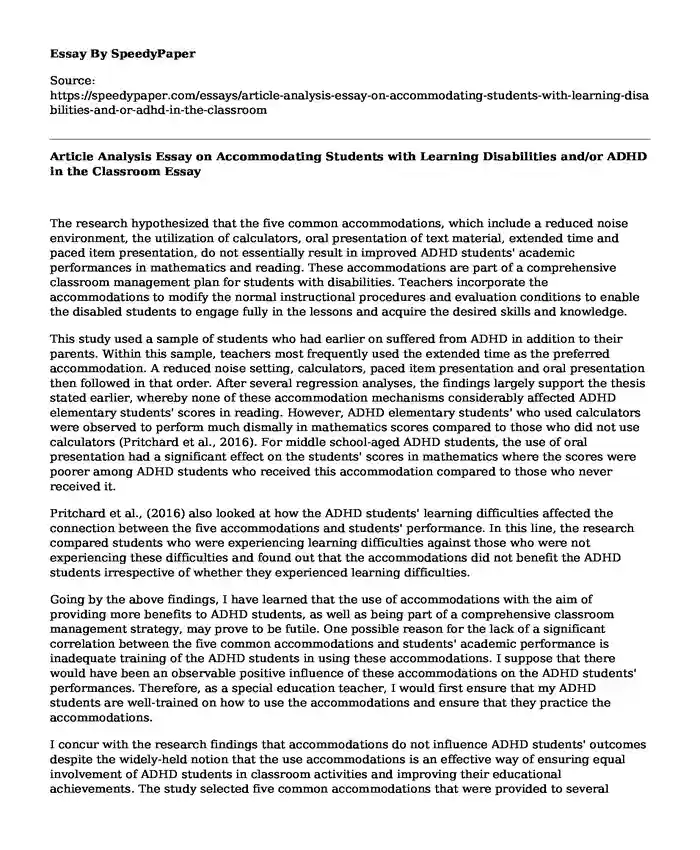
| Type of paper: | Article review |
| Categories: | Special education Psychological disorder |
| Pages: | 3 |
| Wordcount: | 581 words |
The research hypothesized that the five common accommodations, which include a reduced noise environment, the utilization of calculators, oral presentation of text material, extended time and paced item presentation, do not essentially result in improved ADHD students' academic performances in mathematics and reading. These accommodations are part of a comprehensive classroom management plan for students with disabilities. Teachers incorporate the accommodations to modify the normal instructional procedures and evaluation conditions to enable the disabled students to engage fully in the lessons and acquire the desired skills and knowledge.
This study used a sample of students who had earlier on suffered from ADHD in addition to their parents. Within this sample, teachers most frequently used the extended time as the preferred accommodation. A reduced noise setting, calculators, paced item presentation and oral presentation then followed in that order. After several regression analyses, the findings largely support the thesis stated earlier, whereby none of these accommodation mechanisms considerably affected ADHD elementary students' scores in reading. However, ADHD elementary students' who used calculators were observed to perform much dismally in mathematics scores compared to those who did not use calculators (Pritchard et al., 2016). For middle school-aged ADHD students, the use of oral presentation had a significant effect on the students' scores in mathematics where the scores were poorer among ADHD students who received this accommodation compared to those who never received it.
Pritchard et al., (2016) also looked at how the ADHD students' learning difficulties affected the connection between the five accommodations and students' performance. In this line, the research compared students who were experiencing learning difficulties against those who were not experiencing these difficulties and found out that the accommodations did not benefit the ADHD students irrespective of whether they experienced learning difficulties.
Going by the above findings, I have learned that the use of accommodations with the aim of providing more benefits to ADHD students, as well as being part of a comprehensive classroom management strategy, may prove to be futile. One possible reason for the lack of a significant correlation between the five common accommodations and students' academic performance is inadequate training of the ADHD students in using these accommodations. I suppose that there would have been an observable positive influence of these accommodations on the ADHD students' performances. Therefore, as a special education teacher, I would first ensure that my ADHD students are well-trained on how to use the accommodations and ensure that they practice the accommodations.
I concur with the research findings that accommodations do not influence ADHD students' outcomes despite the widely-held notion that the use accommodations is an effective way of ensuring equal involvement of ADHD students in classroom activities and improving their educational achievements. The study selected five common accommodations that were provided to several participants without considering their personal problems. I believe that ADHD students experience individual behavioral challenges such as poor attentiveness in class. Such an issue is experienced during the usual teaching sessions or exam time. For any accommodation strategy to be effective in alleviating these problems, the accommodation should specifically address the problem. A teacher should only implement an accommodation that suits a certain behavioral problem. For that reason, implementing accommodations on ADHD students without taking each student's challenges and needs into account will possibly not bear a positive outcome as seen in this research.
References
Pritchard, A. E., Koriakin, T., Carey, L., Bellows, A., Jacobson, L., & Mahone, E. M. (2016). Academic testing accommodations for ADHD: Do they help?. Learning disabilities (Pittsburgh, Pa.), 21(2), 67.
Cite this page
Article Analysis Essay on Accommodating Students with Learning Disabilities and/or ADHD in the Classroom. (2023, Jan 21). Retrieved from https://speedypaper.net/essays/article-analysis-essay-on-accommodating-students-with-learning-disabilities-and-or-adhd-in-the-classroom
Request Removal
If you are the original author of this essay and no longer wish to have it published on the SpeedyPaper website, please click below to request its removal:
- Free Essay on Standardizing American Political Advertisements
- How Urban Life Is Portrayed in Three Poems - Free Essay with Poetry Analysis
- Free Essay on Human Sexuality
- Expository Essay Sample on Mark Twain
- Paper Example on Same-Sex Love: Examining Different Perspectives
- Free Essay about PTSD Disorder: Assessment and Interventions
- Essay Sample on Conflicts with Being Raised By Parents Who Grew Up In Poverty
Popular categories




